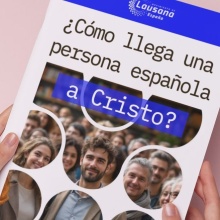

“The Bible sales are evidence of a significant cultural shift regarding matters of faith and religion in this country”, says Sam Richardson.

The latest update from the Observatory of Religious Pluralism reveals a growing presence of religious minorities within Spain's increasingly pluralistic religious landscape.
.jpg)
The new ‘Censis Report’ on the state of Italian society confirms fears about the future, a lack of confidence and a loss of trust in democracy. What does the Church have to say about all this from the perspective of the Gospel?
Tariffs, the dangerous real impact of ‘fakes’, the new Pope, statistics on the growth of evangelicals... And Trump. Here are the most read articles from Evangelical Focus in 2025.
.jpg)
According to the 2025 confirmation preparation survey, 67 percent of boys and 56 percent of girls believe in the existence of God. 75 percent of Finnish youth attend confirmation classes. Are parishes able to respond to young people's growing interest?

Places of worship in the southwestern German state suffered damage worth over a million euros. The figures are “stable overall”, says the government.

The Observatory on Intolerance and Discrimination against Christians in Europe also reports a rise “in legal restrictions affecting freedom of religion”.
.jpg)
The study corroborates the advance of secularism, while minority religions and spirituality not regulated by religious institutions are emerging. New references to purpose in the family, pets or nature are on the rise.

Church growth statistics, Rosalía's new album, and the testimony of a former football star released from prison are causing reactions of surprise throughout the press and television.

Experts on spirituality and youth in Spain stress the need for a more concise analysis to understand current Generation Z trends.
.jpg)
According to official data from 2024, abortions in public health centres are on the rise. 94.6% are requested by the woman, a record high.
.jpg)
Six in ten young people in Germany believe that using social media worsens mental health. A large majority of adults believe that children under 16 should not have online profiles.
.jpg)
The figures, although shocking, are not the end: they are the starting point for action. Every time we listen, every time we accompany, we can stop a fall.
.jpg)
Young people and those who are members of free evangelical churches are the most likely to believe that God created the universe.

A Pew Research Center survey shows that ‘nones’ in Europe “are much less inclined” to believe in God, and “tend to voice negative views of religion”.

According to the United Bible Societies annual report, almost 26 million digital Bibles were distributed, compared to 22 million printed Bibles.
.jpg)
According to official data, evangelical churches outnumber Muslim places of worship, which are the second most numerous and have a greater presence in villages.

Faith and academic leaders issue a letter expressing concern over the issue. "In an increasingly polarised world, theology helps us to understand other points of view”, they say.

Data from the Federal Statistical Office also show that among Protestants, women account for over 50% of students.

According to the data of the Department of Health, 1 in 6 pregnancies ends in abortion. That is a surge of almost 9% compared to 2023.

The Lausanne Movement in Spain surveyed 170 people who converted to Christianity in the last 15 years. Three out of four said they heard about the Gospel ‘through someone close to them’.
.jpg)
A new Pew Research study focusing on the decade 2010-2020 shows how birth rates are key to the growth of Islam, while Christianity shifts its centre of gravity from the US and Europe to Africa.
.jpg)
Baptists and Mennonites were later joined by Moravians and Methodists, the Salvation Army, the Plymouth Brethren, various Evangelical streams and eventually Pentecostals, in the voluntary, free church tradition.

Religious marriages fall to a quarter of the total at the beginning of the century and the presence of Catholicism in public schools is reduced by half.
.jpg)
The gut feeling of many Europeans – and certainly that of many Swedes – is pointing them in the wrong direction.

Las opiniones vertidas por nuestros colaboradores se realizan a nivel personal, pudiendo coincidir o no con la postura de la dirección de Protestante Digital.